
January 30
1882 Birth: Franklin Delano Roosevelt:

On this day in 1882, future President Franklin Delano Roosevelt is born.
Roosevelt grew up the only child in an upper middle-class family in Hyde Park, New York. He graduated from Harvard in 1904 and later received a degree from Columbia Law School. In 1905, Roosevelt married his influential future first lady, Eleanor, a niece of Theodore Roosevelt and a distant cousin. Roosevelt's early involvement in politics included a seat in the New York State Senate and the role of Woodrow Wilson's assistant secretary of the Navy during World War I. In 1920, Roosevelt ran for vice president on the unsuccessful Democratic ticket against Warren Harding. He served as governor of New York from 1929 to1932, during which time he tested out various programs to help the needy that would later form the backbone of his New Deal social and economic policies. Roosevelt's personal appeal and a platform based on Wilsonian policies of a strong federal role in boosting industry and the public welfare led to his election as the 32nd president of the United States in 1933.
In 1921 at the age of 39, Roosevelt contracted a rare incidence of adult polio and lost the use of his legs. Although his disability was not a secret, the Roosevelt administration had a tacit agreement with photographers that they would avoid snapping images of the president being carried by assistants or using a wheelchair. During this era the American public still considered paraplegics crippled or weak, a stereotype Roosevelt fought throughout his presidency. Known for his sense of humor and optimism in the face of adversity, it was perhaps his own personal challenges that allowed him to appreciate the struggles of others. In 1938, Roosevelt founded the March of Dimes to raise funds for polio research and rehabilitation.
In 1933, Roosevelt embarked on an ambitious effort to jump-start the economy through federal work and welfare policies, which included the creation of the Work Projects Administration (WPA), the Federal Industrial Recovery Act and the Civilian Conservation Corps (CCC). The New Deal, as he dubbed his policies, was met in some quarters by opposition and controversy—Roosevelt was accused of practicing socialism in an era of rampant anti-communism, overreaching presidential power and being a big government spender. Some of Roosevelt's programs were even ruled unconstitutional by the Supreme Court. However, many of FDR's New Deal reforms, including Social Security and the minimum wage, were maintained by successive conservative and liberal administrations.
At the same time as he faced unprecedented domestic problems, Roosevelt warily observed the rise of fascist dictatorships in Europe during the mid-1930s. While the German army stormed across Europe, Roosevelt tried to appease the American public's entrenched isolationism by only gradually increasing U.S. aid to democratic European nations. As the war in Europe progressed, Roosevelt stepped up financial and humanitarian aid to Great Britain and France. When it looked as if Hitler might invade Britain after the saturation bombing of London, Roosevelt boldly launched the lend-lease program early in 1941, which promised massive weapons and war-material exports to Britain. During one of his signature fireside chat radio addresses, Roosevelt referred to the U.S. as an arsenal of democracy to help explain America's increasing involvement in the European war and galvanize public support for the lend-lease program. When Japan bombed Pearl Harbor on December 7, 1941, Roosevelt asked Congress to declare war and American industry then underwent a massive conversion to defense production. During the war, Roosevelt kept a tight rein on labor disputes between management and labor and implemented stringent rationing. He worked closely with Allied leaders to plan the liberation of Europe, which was led by American troops.
In delicate war-time negotiations with Stalin, Roosevelt recognized the strategic importance of relying on the Soviet Union to divert Hitler's attention away from an Allied liberation of Europe. At the same time, Roosevelt earned harsh criticism at home and among the Allies for accommodating the communist leader. Many saw Roosevelt's concessions to Stalin regarding post-war territorial issues as a violation of democratic principles. Critics blamed Roosevelt for giving Stalin most of Eastern Europe, thus ensuring the Soviet Union's rise to world-power status during the Cold War. In addition, post-war conspiracy theorists suggested Roosevelt knew of Japan's plan to bomb Pearl Harbor in advance and let it go forward to galvanize Americans' support for the war. He was also accused of being insensitive to the plight of Jews during the Holocaust. Yet Roosevelt's war-time diplomacy did have its successes—it contributed to the defeat of fascist Nazi Germany and Japan and ended in the formation of the United Nations.
In all, Roosevelt served four terms—his election to a third and fourth term were unprecedented—and his presidency spanned two of the nation's greatest crises, the Great Depression and the Second World War, a testament to his popularity and the faith he was able to inspire in the American people. (It was only a decade later that Congress adopted the 22nd Amendment to the Constitution, which limits presidents to two consecutive terms.) Roosevelt's health deteriorated rapidly toward the end of the war and he died on April 12, 1945, of a stroke at his home in Warm Springs, Georgia, leaving Vice President Harry Truman to see the U.S. to victory. Whether reviled as a near-socialist or a beloved as a New Deal warrior for the people, Roosevelt's influence on American politics was significant and longstanding—every subsequent president has invoked his name at one point or another in support of their own policies. (History.com)
1915 World War I: Various:
France: A German submarine attacks Le Havre.

Mediation: Colonel Edward M. House, Wilson's good friend and advisor, sails to Europe on the Lusitania to try to mediate a peace settlement. Both sides still feel they can get what they want and are unwilling to settle the conflict so quickly. (Schlesinger I) (THP)
1920 Japan: Mazda founded in Hiroshima:
Jujiro Matsuda (1875-1952) forms Toyo Cork Kogyo, a business that makes cork, in Hiroshima, Japan; just over a decade later the company produces its first automobile and eventually changes its name to Mazda. Today, Mazda is known for its affordable, quality-performance vehicles, including the Miata, the world's best-selling two-seat roadster.
In 1931, the company launched the Mazda-Go, a three-wheeled vehicle that resembled a motorcycle with a cargo-carrier at the back. The company's car development plans were halted during World War II and the bombing of Hiroshima. [For further information, click here]
1927 Weimar: Thuringia: The NSDAP gains two out of fifty-six seats in the Landtag. (Maser)
The middle 1920s have often been called the golden years of Weimar. Germany regained something like her pre-war standard of living. The arts flourished, with names that are still famous today, Brecht, Kurt Weill, the Threepenny Opera, the Bauhaus. The real strength of the German recovery is, however, still a matter of debate, for political and economic weaknesses continued. It was difficult under the Weimar political system to produce stable government. This is often attributed to the large number of political parties and the need to form coalitions which proved short-lived. The blame for this is put on the electoral system of strict proportional representation, which allowed even small parties to get a few members elected and immediately reflected, without any barrier, the rise and fall of parties. It would not, however, have been possible to introduce in Germany a first-past-the-post electoral system leading to a two-party system along British lines. Five or six major parties had survived from the imperial period and coalition government was unavoidable. Part of the problem was that the parties found it difficult to co-operate. This in turn was aggravated by the existence of extremist parties on the right and the left. It was difficult for the SPD, usually the largest party, to enter into coalition with the middle-class parties, for its working-class voters might then defect to the Communist party, which always had at least a quarter of the left-wing vote. The irreconcilable division of the left was one of the reasons why the Nazis eventually took over with such ease.
1928 Death: Douglas Haig: British field marshal: Sudan, Boer war, World War I.
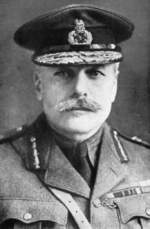
Haig's nickname was the butcher. He'd think nothing of sending thousands of men to certain death. The utter waste and disregard for human life and human suffering by the so-called educated classes who ran the country. What a wicked waste of life. I'd hate to be in their shoes when they face their maker.
1933 Various:

Germany: Adolf Hitler is named chancellor of Germany:
On this day in 1933, President Paul von Hindenburg names Adolf Hitler, leader or Fuehrer of the National Socialist German Workers Party (or Nazi Party), as chancellor of Germany.
The year 1932 had seen Hitler's meteoric rise to prominence in Germany, spurred largely by the German people's frustration with dismal economic conditions and the still-festering wounds inflicted by defeat in the Great War and the harsh peace terms of the Versailles treaty. A charismatic speaker, Hitler channeled popular discontent with the post-war Weimar government into support for his fledgling Nazi party. In an election held in July 1932, the Nazis won 230 governmental seats; together with the Communists, the next largest party, they made up over half of the Reichstag.
Hindenburg, intimidated by Hitler's growing popularity and the thuggish nature of his cadre of supporters, the SA (or Brownshirts), initially refused to make him chancellor. Instead, he appointed General Kurt von Schleicher, who attempted to steal Hitler's thunder by negotiating with a dissident Nazi faction led by Gregor Strasser. At the next round of elections in November, the Nazis lost ground—but the Communists gained it, a paradoxical effect of Schleicher's efforts that made right-wing forces in Germany even more determined to get Hitler into power. In a series of complicated negotiations, ex-Chancellor Franz von Papen, backed by prominent German businessmen and the conservative German National People's Party (DNVP), convinced Hindenburg to appoint Hitler as chancellor, with the understanding that von Papen as vice-chancellor and other non-Nazis in key government positions would contain and temper Hitler's more brutal tendencies.
Hitler's emergence as chancellor on January 30, 1933, marked a crucial turning point for Germany and, ultimately, for the world. His plan, embraced by much of the German population, was to do away with politics and make Germany a powerful, unified one-party state. He began immediately, ordering a rapid expansion of the state police, the Gestapo, and putting Hermann Goering in charge of a new security force, composed entirely of Nazis and dedicated to stamping out whatever opposition to his party might arise. From that moment on, Nazi Germany was off and running, and there was little Hindenburg or von Papen—or anyone—could do to stop it.
Germany: Brownshirts (SA) and Communists violently clash in the streets throughout Germany. The SA celebrates Hitler's accession to power with a torchlight parade through Berlin.
Hitler stood on the Chancellery balcony in salute as a huge torchlight procession of 100,000 excited supporters marched past in triumph. They were singing the Horst Wessel song. This was a great hour for the rank and file. All the efforts of a handful of reactionary advisers in the presidential palace had failed to keep the leader from power. At last the long-awaited "National Revolution" would begin. In fact Hitler did not stand alone. A hundred meters away a slightly bewildered Hindenburg stood at an open window of the presidential palace as the procession passed. It was a timely reminder that Hitler had not seized power. He had come to office by a sordid backstairs intrigue and with the president's consent. He was chancellor, but in a government of "national concentration," surrounded by such orthodox reactionaries as Hugenburg and Seldte of the Stahlhelm. There were in fact only two Nazis in the cabinet, Frick, minister of the interior, and Goering, minister without portfolio and Prussian minister of the interior. Papen, vice-chancellor in the new cabinet, was elated by the success of his intrigue. He believed that he had taken Hitler prisoner and succeeded where Bruening and Schleicher failed. "In two months we will have pushed Hitler into a corner so hard that he'll be squeaking," Papen boasted to a friend.
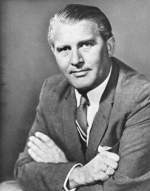
Wunderwaffen: German rocket scientist Wernher von Braun begins work on the Aggregat 1 (A1) and Aggregat 2 (A2) programs with permanent, on-going funding; the first rocket program anywhere ever to be fully funded. Note: Von Braun will soon join the SS (Schutzstaffel) horseback riding school. (Braun, Burrows, Piszkiewicz) [See: Where Would We Be Without Hitler's Scientists?]
Zionism: Juedische Jugendhilfe (Jewish Youth Help): the agency overseeing Youth Aliya (immigration to Palestine), is founded. (THP)
1934 Nazi Germany: Various:
Hitler makes a speech to the Reichstag on the first anniversary of his ascent to power:
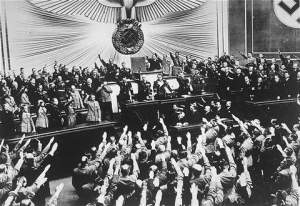
Some of our opponents feel obliged to detract from the glory of our achievements by pointing out that after all the entire People have helped to achieve these goals. They are absolutely right! And we are full of pride that we have really succeeded in rallying the entire nation to help in its renewal. For this is the only way that we were able to solve the problems which defeated many earlier governments, because without this confidence they were bound to fail.
Nazi reorganization strips German states of their sovereignty: The National Socialist government abolishes the Reichsrat, which represented the German states in the national government. This ends the sovereignty of the German states and the federal government, as Germany becomes a national state. [See: How Did Adolf Hitler Consolidate his Power?]
1935: Various:
Nazi Germany: The SS-Hauptamt (Main Office) is established:
The SS Hauptamt controlled all areas of the SS not specifically controlled by any of the other main offices. The SS-HA initially controlled the Allgemeine SS, the concentration camps, the frontier and border personnel, and the political readiness detachments (which evolved into the SS Verfugungstruppe and latter into the Waffen SS). From these, the SS-HA went on to control an even greater number of duties within the SS. In the late 1930's, the SS Hauptamt was the largest and most powerful office of the SS, managing nearly all aspects of the SS. The title of Hauptamt, meaning simply, main office, shows the importance that this postion held within the administration of the SS. With no other qualification in its title, this office was understood to be the most important of those in the SS . . . .
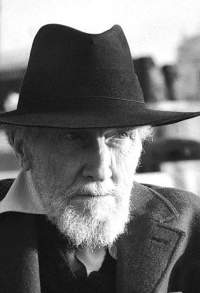
Ezra Pound first meets Mussolini, and reads from a draft of the Cantos.
1937 Various:
Nazi Germany: Hitler makes a speech to the Reichstag on the fourth anniversary of his ascension to power:
Within a few weeks the social prejudices of a thousand years were swept away. So great was the Revolution that its spiritual foundations have not been understood even today by a superficial world. They speak of democracies and dictatorships, and have not realized that in this country a Revolution has taken place that can be described as democratic in the highest sense of the word. Does a more glorious socialism or a truer democracy exist than that which enables any German boy to find his way to the head of the nation? The purpose of the Revolution was not to deprive a privileged class of its rights, but to raise a class without rights to equality.
Nazi Germany: Refusal to join Nazi Party: It was possible to refuse membership. However, only one man did this: Von Eltz-Rubenach, who was the Minister of Posts and Minister of Transport at the time. Proof? A letter from Von Eltz-Rubenach to Hitler:
Berlin, 30 January 1937, Wilhelm Street, 79. My Fuehrer: I thank you for the confidence you have placed in me during the 4 years of your leadership and for the honor you do me in offering to admit me into the Party. My conscience forbids me, however, to accept this offer. I believe in the principles of positive Christianity and must remain faithful to my God and to myself. Party membership, however, would mean that I should have to countenance, without protest, the increasing violent attacks by Party officers on the Christian confessions and on those who wish to remain faithful to their religious convictions. This decision has been infinitely difficult for me, for never in my life have I performed my duty with greater joy and satisfaction than under your wise state leadership. I ask to be permitted to resign. With German greetings, yours very obediently, Baron von Eltz. [Note: Von Eltz-Rubenach was allowed to retire.]
Zionism: The Peel Commission returns to Britain.
1939 Various:
Holocaust: In an address to the Reichstag, Hitler gives notice of his intentions:
"If international Jewry should succeed in Europe or elsewhere, in precipitating nations into a world war, the result will not be the Bolshevization of Europe and a victory for Judaism, but the extermination of the Jewish race." Note: Hitler also comments on the lack of offers from the 'so-called democratic states' to accept Jewish refugees. [See: What Was the Nature of Hitler's Anti-Semitism?]
Church and Reich: Archbishop Groeber in a pastoral letter concedes that Jesus Christ could not be made into an "Aryan," but the son of God had been fundamentally different from the Jews of his time: so much so that they had hated him and demanded his crucifixion, and "their murderous hatred has continued in later centuries. (THP)
1941 World War II: Various:
Hitler, in a speech at the Berlin Sportpalast:
I do not want to miss pointing out what I pointed out on 3rd of September [1940] in the German Reichstag, that if Jewry were to plunge the world into war, the role of Jewry would be finished in Europe. They may laugh about it today, as they laughed before about my prophecies.
North Africa: Australian troops conquer Derna, Libya.
1942 Holocaust: Hitler, at the Berlin Sports Palace, reaffirms his prewar prophecy concerning the Jews; once again telling an audience that "the result of this war will be the complete annihilation of the Jews." An excerpt:
We Germans cannot possibly imagine that if a country near us suddenly decides on a certain form of government, we must declare war on this country just because that particular form of government doesn't suit us. We can't understand this at all, and naturally the others can't understand it either. They did not enter the war for this reason. They did not enter and are not at war because they were irritated by the form of the state. They are capable of embracing the vilest type of government when necessary and of fraternizing with it. No, no, it is not a question of a form of a government, but other reasons which brought them previously into a war against the German state.
1943 World War II: Various:
Stalin to FDR and Churchill:
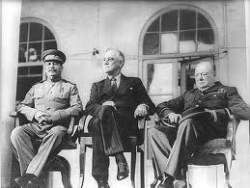
Thank you for informing me about the Casablanca decisions about operations to be undertaken by the US and British armed forces in the first nine months of 1943. Assuming that your decisions on Germany are designed to defeat her by opening a second front in Europe in 1943, I should be grateful if you would inform me of the concrete operations planned and of their timing. As to the Soviet Union, I can assure you that Soviet armed forces will do all in their power to continue the offensive against Germany and her Allies on the Soviet-German front. We expect to finish our winter campaign, circumstances permitting in the first half of February. Are troops are tired, they are in need of rest and they will hardly be able to carry on the offensive beyond that period.
RAF launches massive daytime raid on Berlin:
On this day, the British Royal Air Force begins a bombing campaign on the German capital that coincides with the 10th anniversary of Hitler's accession to power.
The Casablanca Conference, held from January 14 to 23, saw Prime Minister Winston Churchill, President Franklin D. Roosevelt, and the Combined Chiefs of Staff meet in Morocco to discuss future war strategy following on the success of the North African invasion, which heralded the defeat of Vichy forces. One of the resolutions of the conference was to launch a combined and sustained strategic bombing effort against the Germans. Strategic bombing was the policy of using bombers to destroy an enemy's warmaking capacity, also referred to as "area bombing." Churchill described it as an "absolutely devastating, exterminating attack by very heavy bombers . . . upon the Nazi homeland."
To celebrate the anniversary of Hitler's 1933 appointment to the office of chancellor by then-President Paul von Hindenburg, both propaganda minister Joseph Goebbels and head of the Luftwaffe Hermann Goering planned to give radio addresses to the German masses. Goebbels intended to bolster morale by hailing an impending victory in Russia: "A thousand years hence, every German will speak with awe of Stalingrad and remember that it was there that Germany put the seal on her victory." As the speeches were broadcast, RAF fighters rained bombs on Berlin, the beginning of devastating attacks on German cities that would last until the very end of the war. To make matters even worse for the Germans, the next day a massive surrender of German troops occurred at Stalingrad. (History.com)
Stalingrad:
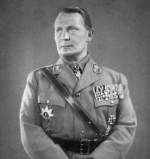
Special radio broadcast by Hermann Goering on the anniversary of Hitler's accession to power: 'A thousand years hence Germans will speak of this battle with reverence and awe.' Paulus signals Hitler: 'The swastika flag is still flying above Stalingrad. May our battle be an example to the present and coming generations, that they must never capitulate even in a hopeless situation, for them Germany will emerge victorious.'

Hitler promotes General Paulus to Field Marshal: His reasoning: No German Field Marshal had ever surrendered to the enemy. A number of other officers in the pocket are also promoted.
The Russians locate Paulus' Headquarters in southern Stalingrad and begin to surround it.

Admiral Karl Doenitz is appointed commander-in-chief of the German Navy in place of Admiral Erich Raeder.
The USS Chicago sinks in the Pacific Ocean:
She sailed from Noumea to escort a Guadalcanal convoy. On the night of the 29th, as the ships approached that bitterly contested island, Japanese aircraft attacked the force and the Battle of Rennell Island was underway. During the attacks, two burning Japanese planes silhouetted Chicago, providing light for torpedo attacks; two hits caused severe flooding and loss of power. By the time the attack ended, fine work on board had checked Chicago's list. Louisville (CA-28) took the disabled ship in tow and was relieved by a tugboat the following morning. During the afternoon, the Japanese attacked again and, despite heavy losses, managed to hit the disabled cruiser with four more torpedoes which sank her.
1944 World War II: Marshall Islands :The US invades Majuro:
This day's Magic summary contains a dispatch from Baron Oshima in Berlin, informing his home office of recent conversations with Hitler. Hovering over a map of Britain, Hitler tells Oshima:I do not know whether they (the Allies) will attack on a large or small scale, or at what point. But the Anglo-Saxons positively cannot go on without invasion, and I, for one, think we may get a chance to give them an awful blow. Besides, don't forget our coming retaliation against England. We are going to do it principally with rocket guns. Everything is now ready, and practice shows that they are extremely effective. Now take this line running to the Birmingham area (Hitler points to map); that is a good place to start. I cannot tell you just when we will begin, but we are really going to do something to the British Isles. We also have two thousand schnell (fast) bombers, and last night we carried out our first bombing of London. With all these various (word missing), I belief we can gradually regain the initiative and, seizing our opportunities, turn once again against Russia. (Lee) [See: Wunderwaffen: Hitler's Deception and the History of Rocketry.]
1945 World War II: Various:

The Soviet sub S-13, commanded by Alexander Marinesko, hit the Gustloff with a spread of three torpedoes. The Gustloff immediately leaned to starboard, righted itself, and then leaned to again. She then launched rescue flares and broadcast an SOS. According to an eye-witness account of Oberbootsmannsmatt Karl Hoffman, the first torpedo struck the Gustloff at the bow, directly below the helm deep below the waterline. The second torpedo exploded under the area of the ship that was the swimming pool.
From Grand Admiral Doenitz's IMT Testimony:At the end of the war I was given the task of organizing largescale transports in the Baltic Sea. Gradually the necessity arose to move the hundreds of thousands of poverty-stricken refugees out of the coastal areas of East and West Prussia where they were exposed to starvation, epidemics, and bombardment and to bring them to Germany. For this reason I made enquiries about merchant shipping, which was not actually under my jurisdiction; and in so doing I learned that out of eight ships ordered in Denmark, seven had been destroyed by saboteurs in the final stage of construction. I called a meeting of all the departments connected with those ships and asked them, "How can I help you so that we get shipping space and have damaged ships repaired more quickly?"
I received suggestions from various quarters outside the Navy, including a suggestion that repair work, et cetera, might be speeded up by employing prisoners from the concentration camps. By way of justification, it was pointed out, in view of the excellent food conditions, such employment would be very popular. Since I knew nothing about the methods and conditions in the concentration camps, I included these proposals in my collection as a matter of course, especially as there was no question of making conditions worse for them, since they would be given better food when working. And I know that if I had done the opposite I could have been accused here of refusing these people an opportunity of having better food. I had not the slightest reason to do this, as I knew nothing about any concentration camp methods at the time.

Hitler: Last annual message by radio on anniversary (12th) of coming to power:
I particularly address myself to German youth. In vowing ourselves to one another, we are entitled to stand before the Almighty and ask Him for His grace and His blessing. No people can do more than that everybody who can fight, fights, and that everybody who can work, works, and that they all sacrifice in common, filled with but one thought: to safeguard freedom and national honor and thus the future of life. However grave the crisis may be at the moment, it will, despite everything, finally be mastered by our unalterable will. [For the full text, Click here.]
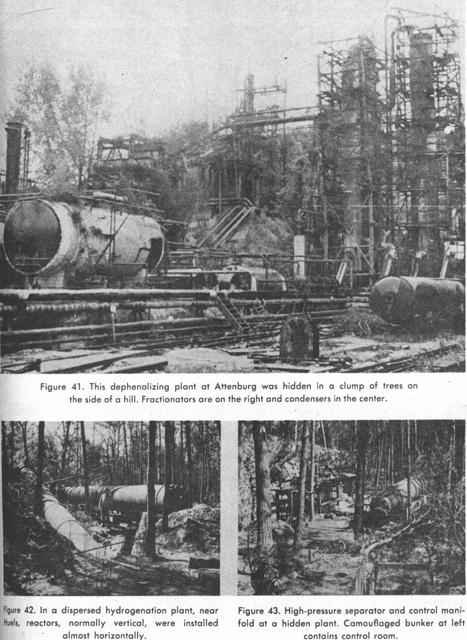
After the loss of Upper Silesia, the German armament production will no longer be in a position to cover even a fraction of the requirements of the front as regards munitions, weapons and tanks, losses on the front, and equipment needed for new formations . . . . The material superiority of the enemy can therefore no longer be compensated, even by the bravery of our soldiers. [See: The Last Days of the Third Reich.]

At that time Hitler issued the slogan that in defense of the fatherland the soldiers' bravery would increase tremendously and that vice versa the Allied troops, after the liberation of the occupied territories, would have less will to fight. That was also the main argument employed by Goebbels and Bormann to justify the use of all means to intensify the war . . . .
Guderian, the Chief of Staff of the Army, reported to Ribbentrop at that time to tell him that the war was lost. Ribbentrop reported this to Hitler. Hitler then told Guderian and myself at the beginning of February that pessimistic statements of the nature of those contained in my memorandum or the step I had taken in regard to the Reich Minister for Foreign Affairs would in future be considered as high treason and punished accordingly. In addition, some days later, in a situation conference, he forbade his other close collaborators to make any statements about the hopelessness of the situation. Anyone who disobeyed would be shot without regard for position or rank and his family would be arrested. The statements which Guderian and I made to Hitler about the hopelessness of the war situation had precisely the opposite effect from that which we desired. Early in February, a few days before the beginning of the Yalta Conference, Hitler sent for his press expert and instructed him, in my presence, to announce in the most uncompromising terms and in the entire German press, the intention of Germany never to capitulate. He declared at the same time that he was doing this so that the German people should in no case receive any offer from the enemy. The language used would have to be so strong that enemy statesmen would lose all desire to drive a wedge between himself and the German people.
At the same time Hitler once again proclaimed to the German people the slogan "Victory or Destruction." All these events took place at a time when it should have been clear to him and every intelligent member of his circle that the only thing that could happen was destruction. At a Gauleiter meeting in the summer of 1944 Hitler had already stated—and Schirach is my witness for this—that if the German people were to be defeated in the struggle it must have been too weak, it had failed to prove its mettle before history and was destined only to destruction. Now, in the hopeless situation existing in January and February 1945, Hitler made remarks which showed that these earlier statements had not been mere flowers of rhetoric. During this period he attributed the outcome of the war in an increasing degree to the failure of the German people, but he never blamed himself. He criticized severely this alleged failure of our people who made so many brave sacrifices in this war. [See: Why Did Hitler Insist on No Surrender?]
1946 Nuremberg Tribunal: Day 46. Continuation of M. Charles Dubost's Presentation of the case regarding atrocities committed in the occupied countries of the West.
M. Charles Dubost:Another aspect of this policy of terror and extermination appears when one studies the war crimes committed by Germany on the persons of prisoners of war. These crimes, as I shall prove to you, had two motives, among others: To debase the captives as much as possible in order to sap their energy; to demoralize them; to cause them to lose faith in themselves and in the cause for which they fought, and to despair of the future of their country. The second motive was to cause the disappearance of those of them who, by reasons of their previous history or indications given since their capture, showed that they could not be adapted to the new order the Nazis intended to set up.
With this aim, Germany multiplied the inhuman methods of treatment intended to debase the men in her hands, men who were soldiers and who had surrendered, trusting to the military honor of the army to which they had surrendered.
The transfer of prisoners was carried out under the most inhumane conditions. The men were badly fed and were obliged to make long marches on foot, exposed to every kind of punishment, and struck down when they were tired and could no longer follow the column. No shelter was provided at the halting places and no food. [For further details, Click here.]
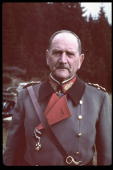
1947 Death: Franz Ritter von Epp in American internment. Bavarian Colonel in World War I. After the war, Epp organized the counter-revolutionary Free Corps and "liberated" Munich from the "Reds." Joined Nazi party in 1928. Reich governor of Bavaria in 1933. Promoted to the rank of general in 1935. Was among Hitler's critics inside the party. Shortly before the end of the war, attempted an uprising against the NSDAP in Bavaria.

1948 Gandhi assassinated: Mohandas Karamchand Gandhi, the political and spiritual leader of the Indian independence movement, is assassinated in New Delhi by a Hindu fanatic. [For further information, click here]
1951 Death: Ferdinand Porsche: German car inventor, whose work included the Volkswagen. [See: The Secret History of the Volkswagen.]
1958 Death: Ernest H. Heinkel German airplane builder.
1965 Silent crowds line the streets to watch the gun carriage bearing Sir Winston's coffin leave Westminster Hall as Big Ben struck 0945. The procession travelled slowly through central London to St Paul's cathedral for the funeral service. Sir Winston died six days ago, following a stroke earlier in the month from which he never regained consciousness. A total of 321,360 people filed past the catafalque during the three days of lying-in-state. Note: Click above picture for video of the funeral.
1968 Tet Offensive shakes Cold War confidence: In coordinated attacks all across South Vietnam, communist forces launch their largest offensive of the Vietnam War against South Vietnamese and U.S. troops. [For further information, click here]
Edited by Levi Bookin (Copy editor)
levi.bookin@gmail.com



Click to join 3rdReichStudies



Disclaimer: This site includes diverse and controversial materials--such as excerpts from the writings of racists and anti-Semites--so that its readers can learn the nature and extent of hate and anti-Semitic discourse. It is our sincere belief that only the informed citizen can prevail over the ignorance of Racialist "thought." Far from approving these writings, this site condemns racism in all of its forms and manifestations.
Fair Use Notice: This site may contain copyrighted material the use of which has not always been specifically authorized by the copyright owner. We are making such material available in our efforts to advance understanding of historical, political, human rights, economic, democracy, scientific, environmental, and social justice issues, etc. We believe this constitutes a "fair use" of any such copyrighted material as provided for in section 107 of the US Copyright Law. In accordance with Title 17 U.S.C. Section 107, the material on this site is distributed without profit to those who have expressed a prior interest in receiving the included information for research and educational purposes. If you wish to use copyrighted material from this site for purposes of your own that go beyond 'fair use', you must obtain permission from the copyright owner.
Please Note: The list-owner and the moderator of 3rdReichStudies are not responsible for, and do not necessarily approve of, the random ads placed on our pages by our web server. They are the unfortunate price one pays for a 'free' website.